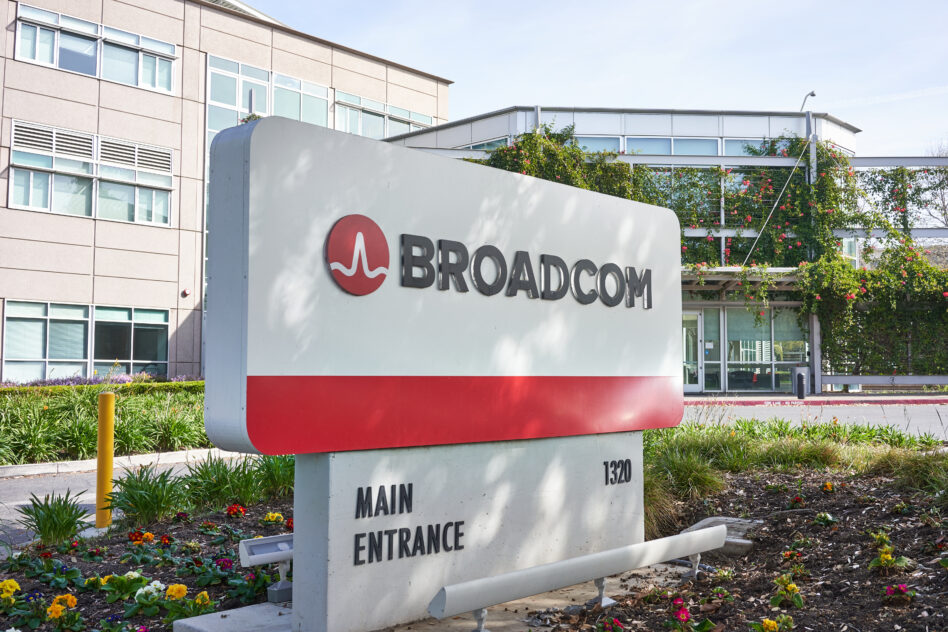
Image credit: Tada Images/Shutterstock
Apple has announced a multiyear, multibillion-dollar deal to extend its agreement with chip-supplying company Broadcom. The new deal comes at a time when Apple has been looking to develop more components for the iPhone in-house.
For some time now, it has been a goal for Apple to replace parts such as chips made by outside companies with components it manufactures. Recently it replaced Intel as a chip supplier for its laptop and desktop computers with its own version, but when it comes to developing cellular modem chips, Apple has struggled.
As part of the agreement, Broadcom will also provide Apple with both wireless-connectivity components and 5G radio-frequency parts. The 5G radio-frequency modules will be produced in several locations across the United States and will continue to invest in the U.S. economy and support America’s future, according to Apple’s chief executive. As proof of this, Apple recently disclosed that has been sourcing certain US-made components from Broadcom for a while now. Several years ago, the two companies signed a multiyear deal that was at the time set to generate an estimated 15 billion dollars.
That deal is now set to expire this year and analysts now estimate the new deal, which will run until 2026, to be worth at least another $15 billion. The new deal also squashes any speculation that Apple intended to phase out Broadcom from manufacturing chips for its devices by 2025.
As a result of the new deal, Broadcom shares rose by roughly 2.5% this week, resulting in stock reaching near-record highs. On the other hand, Apple shares have not seen any real boost in the market as a by-product of the announcement of the deal. For years now, Apple has dealt with both political and economic pressure to base more of its manufacturing in the United States. These issues were further amplified during the pandemic, when several aspects of operations were moved and being completely conducted outside of America, in favor of countries like China.
With the relationship between the US and China being increasingly troubled lately, Apple has undergone heavy pressure to conduct less business in China and look to other countries as potential manufacturers. To counteract this pressure, Apple recently revealed plans to base more of its production outside of China and has now intensified operations in countries such as Vietnam and India. The company has even just started to fully manufacture iPhones in India. Foxconn Technology Group, an electronics contract manufacturer from Taiwan, is also looking to expand its production in India as a viable means of catering to increased demand.
It will be a real challenge for Apple to rearrange and remake its supply and distribution network to be more American-based. Overall, only a little over 10% of the world’s electronics chips are made in the United States, even with the recent $53 billion government incentive bill being passed last year, aimed at swaying the tech industry landscape toward America’s favor.
Several chip makers have recently revealed new large-scale projects in the US, including Taiwan Semiconductor Manufacturing Co., which is Apple’s main supplier of advanced chips currently. The Taiwanese manufacturer is also applying for federal assistance grants to help finance its vision for expansion into America. The company is set to become the largest provider of electronic chips and is currently building a factory in Arizona estimated to cost around $40 billion.
The future for Apple, the world leader in consumer electronics, is one currently in the uncertain process of large-scale change and reorganization. One thing is for certain though, more US-based operations moving forward.

Image credit: Tada Images/Shutterstock
Apple has announced a multiyear, multibillion-dollar deal to extend its agreement with chip-supplying company Broadcom. The new deal comes at a time when Apple has been looking to develop more components for the iPhone in-house.
For some time now, it has been a goal for Apple to replace parts such as chips made by outside companies with components it manufactures. Recently it replaced Intel as a chip supplier for its laptop and desktop computers with its own version, but when it comes to developing cellular modem chips, Apple has struggled.
As part of the agreement, Broadcom will also provide Apple with both wireless-connectivity components and 5G radio-frequency parts. The 5G radio-frequency modules will be produced in several locations across the United States and will continue to invest in the U.S. economy and support America’s future, according to Apple’s chief executive. As proof of this, Apple recently disclosed that has been sourcing certain US-made components from Broadcom for a while now. Several years ago, the two companies signed a multiyear deal that was at the time set to generate an estimated 15 billion dollars.
That deal is now set to expire this year and analysts now estimate the new deal, which will run until 2026, to be worth at least another $15 billion. The new deal also squashes any speculation that Apple intended to phase out Broadcom from manufacturing chips for its devices by 2025.
As a result of the new deal, Broadcom shares rose by roughly 2.5% this week, resulting in stock reaching near-record highs. On the other hand, Apple shares have not seen any real boost in the market as a by-product of the announcement of the deal. For years now, Apple has dealt with both political and economic pressure to base more of its manufacturing in the United States. These issues were further amplified during the pandemic, when several aspects of operations were moved and being completely conducted outside of America, in favor of countries like China.
With the relationship between the US and China being increasingly troubled lately, Apple has undergone heavy pressure to conduct less business in China and look to other countries as potential manufacturers. To counteract this pressure, Apple recently revealed plans to base more of its production outside of China and has now intensified operations in countries such as Vietnam and India. The company has even just started to fully manufacture iPhones in India. Foxconn Technology Group, an electronics contract manufacturer from Taiwan, is also looking to expand its production in India as a viable means of catering to increased demand.
It will be a real challenge for Apple to rearrange and remake its supply and distribution network to be more American-based. Overall, only a little over 10% of the world’s electronics chips are made in the United States, even with the recent $53 billion government incentive bill being passed last year, aimed at swaying the tech industry landscape toward America’s favor.
Several chip makers have recently revealed new large-scale projects in the US, including Taiwan Semiconductor Manufacturing Co., which is Apple’s main supplier of advanced chips currently. The Taiwanese manufacturer is also applying for federal assistance grants to help finance its vision for expansion into America. The company is set to become the largest provider of electronic chips and is currently building a factory in Arizona estimated to cost around $40 billion.
The future for Apple, the world leader in consumer electronics, is one currently in the uncertain process of large-scale change and reorganization. One thing is for certain though, more US-based operations moving forward.



